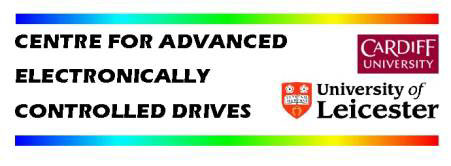|
|
Department of Engineering |
|
|||||
|
|
|||||||
Centre for Advanced Electronically Controlled DrivesResearch and Development for Manufacturing IndustryThis centre and these projects
have mostly moved to the Company Technelec
Ltd, Professor Charles Pollock and Professor Hugh Bolton
|
|
||||||
What is the Centre for Advanced Electronically Controlled Drives ?The Centre began operation in October 1997 after winning a “Sector Challenge” Award from the Department of Trade and Industry for a project to enhance the competitiveness of the Electrical Engineering Sector of U.K. Industry. The aim of the Centre is to create a permanent mechanism for companies and universities to collaborate on fundamental and applied research for electronically controlled drives.The use of variable speed, electronically controlled drives is increasing throughout industry as the need to improve efficiency, reduce acoustic noise and reduce system cost becomes paramount. The Centre for Advanced Electronically Controlled Drives is concentrating on the development of switched reluctance, flux switching and brushless dc technology as these technologies offer the most significant potential improvements in the areas of efficiency and low cost. Properly designed drives in these technologies can often be cheaper, lighter and acoustically quieter than induction motor drives. There are now 20 UK company Members of the Centre actively supporting this work.
Why work with the Centre for Advanced Electronically Controlled Drives ?Professor Pollock, has an international track record for innovative engineering solutions in the area of switched reluctance drives. His notable successes in switched reluctance technology are the cancellation of acoustic noise at source, simple power converter circuits with only one switch per phase and high efficiency motor designs which can compete with permanent magnet motors. The invention of the flux switching motor has now resulted in a motor with lower cost and higher performance than the switched reluctance motor.Professor Bolton has an international reputation for the design of electrical machines and actuators and has worked on all types of brushed and brushless motors. Together Professor Pollock and Professor Bolton are enthusiastic supporters of the consortium approach to research in UK Universities. A successful LINK Programme on “Low Cost Switched Reluctance Drives” was actively supported by 21 industrial companies. Some of these are now developing new products containing innovative brushless drives.
What will my company get by becoming a Member of the Centre ?As a Member of the Centre you will(1) Have access to the results of previous and present research for early exploitation in your application. (2) Get the chance to set up Restricted Projects in application specific areas either individually or with a small group of other members; these Restricted Projects may be eligible for further Government funding and can be conducted on a commercial in confidence basis; (3) Gain access to the resources of University Research Laboratories for specialised test equipment, product development and consultancy; (4) Form partnerships with other complementary companies to carry out research and development on a shared cost basis; (5) Participate in training courses for your staff in an area of industry in which there is a recognised skill shortage. What future application specific projects are planned ?(1) High efficiency motors for fans, pumps and compressors. (2) Flux switching motors – a new low cost motor and drive (3) Low cost, brushless motors for automotive auxiliary applications (4) Brushless motors with integrated electronics (5) Electronically regulated brushless dc generators
How much will Membership of the Centre Cost ?The present annual fee for a Full Member is £4,000 p.a. (£2,000 for small companies). In addition companies will be expected to provide some in-kind support to the ongoing research, for instance, by building and testing motors and drives for your applications.Companies who do not expect directly to exploit the research results of the Centre but who can provide goods and services in support of the research work can join as Associate Members at no cost.For Further details please contact
|
|
||||||
|
|
|
|
|
|
|||
Author:
Ewan Goodier, last updated 25/06/2001.
This document has been approved by the Head of Department.


